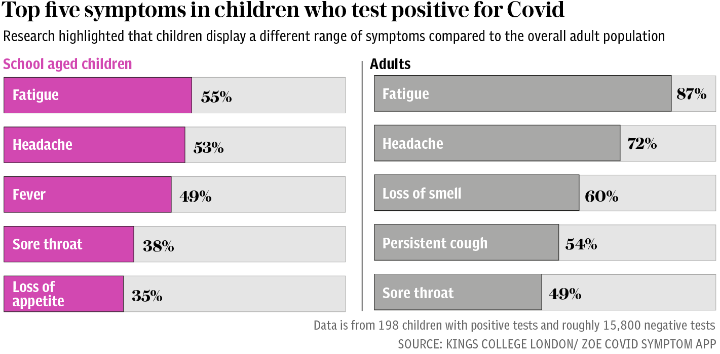Parents with young children could be protected against severe Covid-19

Parents with young children may be protected against severe Covid-19 symptoms because their immune systems are boosted by regularly catching coughs and colds, a study has found.
A team of scientists believes exposure to seasonal coronaviruses from the same family as Covid-19, like the common cold, may prevent people falling seriously ill or requiring hospitalisation if they catch it.
The academics have called for more research to be carried out to try to establish whether primary school and nursery teachers, as well as parents, are benefiting from young children acting as “natural vaccine boosters”.
This latest study, which has not yet been peer reviewed, gathered data from more than 300,000 Scottish households containing a healthcare worker to see whether those living with children under the age of 11 were offered some protection from the virus.
Summarising their results, the authors, led by Dr David McAllister, a senior clinical lecturer in public health at Glasgow University, wrote: “The risk of hospitalisation with Covid-19 was lower in those with one child, and lower still in those with two or more children.”
The report concludes: “Increased household exposure to young children was associated with an attenuated risk of testing positive for Sars-Cov-2 and appeared to also be associated with an attenuated risk of Covid-19 disease severe enough to require hospitalisation.”
They add: “These findings have potentially important implications for future controls of the Covid-19 pandemic, for example through informing policy on nursery and school closure and vaccination.”
However, the authors of the report were at pains to point out their study - the first of its kind - required more research.
They point out how adults living with no children or with teenagers were likely to be older and so likely to have existing health problems making them more susceptible to Covid-19 and potentially more likely to suffer more serious symptoms.
Meanwhile, healthcare workers with young children are more likely to choose part-time work because of childcare concerns, consequently limiting their exposure to the virus while at work.
Although they concede the reasons Covid has proven milder in children “are not well understood” but possibly linked to “developmental factors”, they say exposure to “similar infectious agents” may be relevant, particularly as youngsters have “higher levels of exposure to endemic coronaviruses than adults”.
The paper adds: “If differential exposures to infectious agents is an important mechanism, adults who are close contacts of children, such as childcare providers, teachers and parents may also benefit.”

The paper highlights how “schools and nurseries throughout the world have been closed, resulting in substantial harms to the health and wellbeing of children, while a substantial proportion of staff who work in schools have reported feeling unsafe about the reopening of educational establishments.”
They add: “If exposure to children was found to be protective, rather than harmful, this would have important implications for policy.”
However, they stressed their findings should not yet influence government policy about closing schools or nurseries because their research took place between March and July when schools were shut due to lockdown.
The academics explain how the research provides “sufficient evidence of a potentially interesting protective effect against Covid 19 infection in households with young children to warrant further study”, adding how future studies could focus on primary school and nursery teachers.
Explaining how their research raised “intriguing questions” about whether children could be “natural vaccine boosters”, they add how research could also be carried out to see whether children “pre-immunise” adults by exposing them to “endemic coronaviruses”.

 Yahoo News
Yahoo News 
